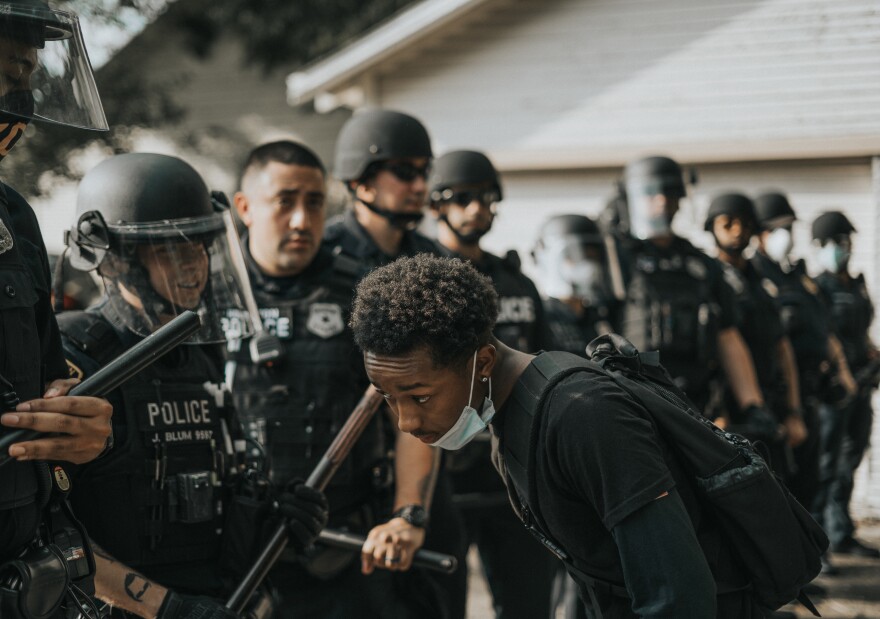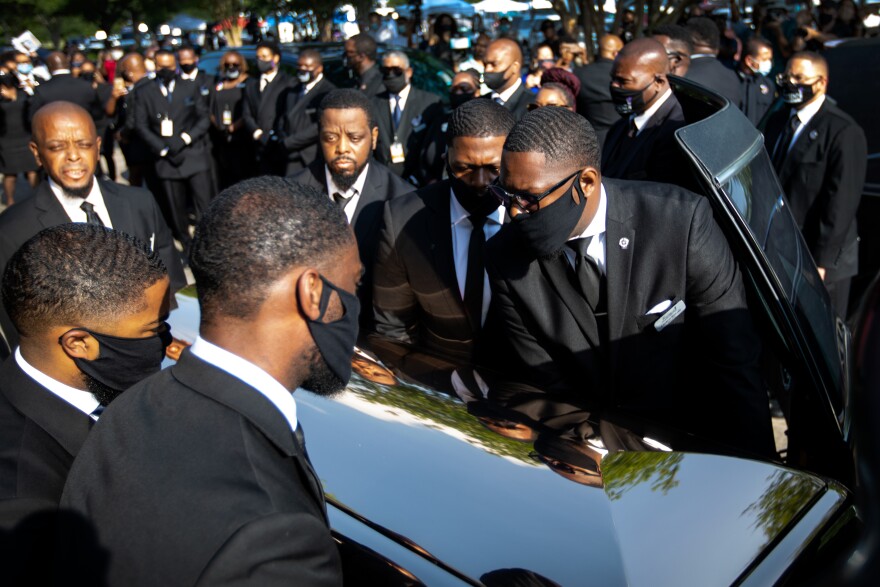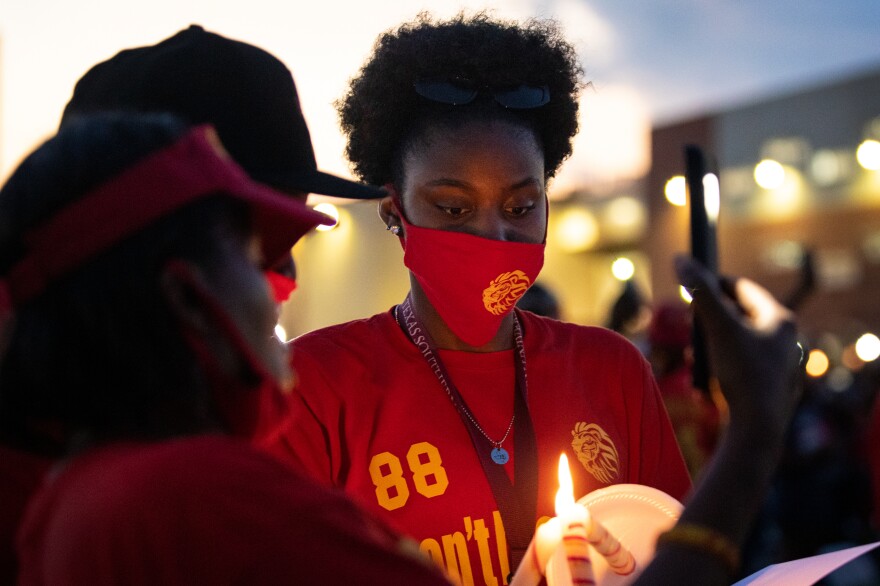The killing of George Floyd by Minneapolis police last month sparked outrage that has spilled into the streets, with mass demonstrations and marches against police brutality and systemic racism.
Black photographers have been documenting the nationwide protests in a way that amounts to telling "our own history in real time," said Brooklyn, N.Y.-based commercial photographer Mark Clennon, "because our parents, and grandparents never really had a chance to have their voices heard."
NPR talked to Clennon and seven other black photographers about what it's been like to document the protests. From Seattle to Washington, D.C., Los Angeles to Houston, they spoke of their own personal histories, of being moved by moments of deep humanity and of witnessing compassion, care and love for black protesters.
Dee Dwyer, Washington D.C.
I consider myself to be the visual voice for the people. Documenting these historical times as a black photographer is extremely important for the world.
For years our narratives have been controlled by predominantly white people, who have been our oppressors. According to past documentation of the black experience and even recently, they have not gotten our stories correct. I feel it's because they do not understand or in most cases don't care about our struggles, joy and language.
My primary focus is humanity. The raw and compelling photographs I create during the protest unveil the souls of my people. I am here to visually clear up any misconceptions of the "misunderstood," which in this case are black people.
Anastassia Whitty, Houston
One of the moments during the protest that touched me was when a [young black man] came up to the front lines of the police. He asked each officer in line a question — if they felt any sympathy about what was going on. And the responses they gave him were: none. They ignored the kid until one officer responded and when I saw that happen, I knew that was a deep moment to capture because it hit me emotionally. No one can answer that question fully to be honest. It's like we are left unanswered about the unfairness the black community has to deal with in this world we live in.

Montinique Monroe, Houston
As a black photojournalist and as the daughter of a black man who was killed by a white police officer, covering the death of George Floyd has been heartbreaking. Many of the images I've made during this coverage were made with tears.
My father was killed by a police officer when I was only an infant and I've been on a journey to tell his story since I was a child. In fact, it's why I became a journalist. Covering Floyd's funeral hits close to home. This isn't just a story for me. This is my life.
Any time a black man dies at the hands of a police officer, I visit the site to pay my respects if possible. I've made images at the sites where Mike Brown, Freddie Gray and Alton Sterling took their last breaths, and recently, Michael Ramos, who was killed by a police officer in Austin, Texas, where my father was killed. While covering Floyd's final public viewing, I paid my respects to him as well.
Black journalists and photographers deserve to tell the stories, which many of us have been fighting for so long to tell. I'm just now receiving the opportunities I've been chasing for years, and while I'm grateful, I hate it happened as a result of the police killing another black man. There's still a long way to go on many fronts.


Chloe Collyer, Seattle
Protests are familiar to me. I've been documenting them for years. The Friday after George Floyd's death brought protesters right outside my own home, and while I was comfortable behind my camera, I couldn't stand what I was witnessing. White men smashing windows and climbing buildings, ignoring the pleas of black protesters to stop. In the days since, I've watched the growing pains of a movement, I've seen youth lead marches of thousands and I've witnessed community organizing like never before. It's an honor to document my city during this time.

Alexis Hunley, Los Angeles
It has been an overwhelming two weeks. I finally hit the point of physical, mental and emotional exhaustion and forced myself to take a few days to rest. Somehow in the middle of resting I found myself in Leimert Park in a sea or beautiful black faces of all ages preparing for a bike ride down Crenshaw.
Motorcyclists, bicyclists and joggers came together to protest the killing of George Floyd, Breonna Taylor, Tony McDade and countless others murdered by the police. Seeing my neighbors smiling, praying and riding together brought me so much joy I had to choke back tears.
This photograph is my favorite by far. This tender embrace between a parent and child almost brought me to my knees. I was unaware how badly I needed to see black people receiving compassion, care and love. It strengthened my resolve and gave me an even greater sense of determination. We will have the justice and freedom that we deserve.

Mark Clennon, Brooklyn, N.Y.
When photographing the George Floyd Rally in Cadman Plaza hosted by his brother, Terrence Floyd, I took a photo of a woman in a mask. This was just after Terrence spoke, and during his speech I was moved to tears. When I began walking to the side, my eyes caught a woman with a mask and afro. It was a comforting, communal glance. I thought to myself, how many people are slowing down to take a look at us, the collective black people, in our eyes to see our humanity? We are real people outside risking exposure to COVID-19 because we see an opportunity to make real change in America.
The crux of the crisis is simple. Black humanity deserves every bit as much as anyone else. Things are different this time, we can see it in each others eyes. Things will never be the same for us as black people in America, we refuse.
There's no going back from here.
As a a black photographer, I never set out to be a journalist. I, like so my other commercial and editorial photographers who have been overlooked for years, stepped in to help in the best way we know how. Showing the humanity of black people with photographs is the best way I know how to help. So thousands of us are picking up our tools, risking our health, to tell our own history in real time, because our parents, and grandparents never really had a chance to have their voices heard.

Stephanie Mei-Ling, Los Angeles
Black women have historically played critical roles in protest movements because racism and police brutality directly affects us. Not only are we being killed, but we are losing our fathers, our brothers, our husbands and our sons.

Kriston Jae Bethel, Norristown, Pa.
There's been a heavy focus on the large protests and resulting conflict with law enforcement that is happening in major cities across the U.S., but what I'm noticing is the number of smaller protests popping up in the suburbs and rural areas. These are often groups of young people who believe in standing up for the change they want to see. These smaller demonstrations may not look as impressive as the masses gathering in our metropolitan centers, and they certainly don't make national headlines, but it's important to remember that racial inequality and injustice doesn't stop at the city limits.
Copyright 2023 NPR. To see more, visit https://www.npr.org.





